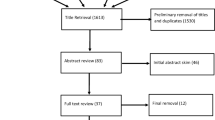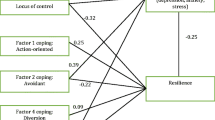Abstract
Research and practice emphasize the importance of family involvement in early intervention for children with autism spectrum disorder (ASD). However, in order to address the unique and diverse challenges of families, support and resources may need to be prescribed on a case-by-case basis. This article suggests ways early intervention programs can assess parent stress, self-efficacy and disability specific knowledge at time of ASD diagnosis to inform family centered intervention programs with attention to individualized support for children with ASD and their families. A variety of assessment tools are provided with rationale for their use of results to inform program intervention and service plans for families of young children with ASD.
Similar content being viewed by others
References
Abidin, R. R. (2012). Parenting stress index (4th ed.). Lutz, FL: PAR.
American Psychiatric Association. (2013). Diagnostic and statistical manual of mental disorders (5th ed.). Arlington, VA: American Psychiatric Publishing.
Bakare, M. O., Ebigbo, P. O., & Ahamefule, O. A. (2008). Knowledge about childhood autism among health workers (KCAHW) questionnaire: Description, reliability and internal consistency. Clinical Practice and Epidemiology in Mental Health, 4, 17–24.
Baker-Ericzen, M., Brookman-Frazee, L., & Stahmer, A. (2005). Stress levels and adaptability in parents of toddlers with and without autism spectrum disorders. Research and Practice for Persons with Severe Disabilities, 30(4), 194–204.
Bandura, A. (1994). Self-efficacy. In V. S. Ramachaudran (Ed.), Encyclopedia of human behavior (Vol. 4, pp. 71–81). Amsterdam: Elseiver.
Beck, A. T., Epstein, N., Brown, G., & Steer, R. A. (1988). An inventory for measuring clinical anxiety: Psychometric properties. Journal of Consulting and Clinical Psychology, 56, 893–897.
Belsky, J. (1984). The determinants of parenting: A process model. Child Development, 55, 83–96.
Benson, P., & Karlof, K. (2009). Anger, stress proliferation, and depressed mood among parents of children with ASD: A longitudinal replication. Journal of Autism and Developmental Disorders, 39(2), 350–362.
Bouma, R., & Schweitzer, R. (1990). The impact of chronic childhood illness on family stress: A comparison between autism and cystic fibrosis. Journal of Clinical Psychology, 46(6), 722–730.
Briggs-Gowan, M. J., Horwitz, S. M., & Carter, A. S. (1997). The family life impairment scale Yale University. New Haven, CT: Department of Psychology.
Carlson, R. G., Daire, A. P., Dominguez, V. N., & Case-Pease, J. (2014). Family adjustment measure. Measurement and Evaluation in Counseling and Development, 47, 91–101.
Cassidy, A., McConkey, R., Truesdale-Kennedy, M., & Slevin, E. (2008). Preschoolers with autism spectrum disorders: The impact on families and the supports available to them. Early Child Development and Care, 178(2), 115–128.
Cohen, S., Kamarck, T., & Mermelstein, R. (1983). A global measure of perceived stress. Journal of Health and Social Behavior, 24, 386–396.
Coleman, P. K., & Karraker, K. H. (2003). Maternal self-efficacy beliefs, competence in parenting, and toddlers’ behavior and developmental status. Infant Mental Health Journal, 24, 126–148. https://doi.org/10.1002/imhj.10048.
Crnic, K. A., & Greenberg, M. T. (1981). Inventory of parent experiences: Manual. Seattle: University of Washington.
Davis, N. O., & Carter, A. S. (2008). Parenting stress in mothers and fathers of toddlers with autism spectrum disorders: Associations with child characteristic. Journal of Autism and Developmental Disorders, 38, 1278–1291. https://doi.org/10.1007/s10803-007-0512-z.
Estes, A., Munson, J., Dawson, G., Koehler, E., Zhou, X., & Abbot, R. (2009). Parenting stress and psychological functioning among mothers of preschool children with autism and developmental delay. Autism, 13, 375–387. https://doi.org/10.1177/1362361309105658.
Glidden, L. M., & Floyd, F. J. (1997). Disaggregating parental depression and family stress in assessing families of children with developmental disabilities: A multi-sample analysis. American Journal on Mental Retardation, 102, 250–266.
Greeff, A. P., Vansteenwegen, A., & Ide, M. (2006). Resiliency in families with a member with a psychological disorder. American Journal of Family Therapy, 34, 285–300. https://doi.org/10.1080/01926180600637465.
Guimond, A. B., Wilcox, M. J., & Lamorey, S. G. (2008). The early intervention parenting self-efficacy scale (EIPSES): Scale construction and initial psychometric evidence. Journal of Early Intervention, 30(4), 295–320. https://doi.org/10.1177/1053815108320814.
Harrison, A. J., Bradshaw, L. P., Naqvi, N. C., Paff, M. L., & Campbell, J. M. (2017a). Development and psychometric evaluation of the autism stigma and knowledge questionnaire (ASK-Q). Journal of Autism and Developmental Disorders, 47, 3281–3295. https://doi.org/10.1007/s1080.
Harrison, A. J., Slane, M. M., Hoang, L., & Campbell, J. M. (2017b). An international review of autism knowledge assessment measures. Autism, 21(3), 262–275. https://doi.org/10.1177/1362361316638786.
Hayes, S. A., & Watson, S. L. (2013). The impact of parenting stress: A meta-analysis of studies comparing the experiences of parenting stress in parents of children with and without autism spectrum disorder. Journal of Autism and Developmental Disorders, 43, 629–642.
Hinman, J. (2019). Individual differences in parent psychosocial factors, child characteristics and behaviors, and parent behavior regulation strategies for children with autism spectrum disorder (Publication No. 27543116) [Doctoral dissertation, Teachers College, Columbia University]. Proquest Dissertations Publishing.
Individuals with Disabilities Education Act, 20 U.S.C. § 1400 (2004)
Johnston, C., & Mash, E. J. (1989). A measure of parenting satisfaction and efficacy. Journal of Clinical Child Psychology, 18, 167–175.
Jones, R. (1999). Early childhood education just keeps mattering more. The Education Digest, 64(8), 8–14.
Jones, T. L., & Prinz, R. J. (2005). Potential roles of parental self-efficacy in parent and child adjustment: A review. Clinical Psychology Review, 25, 341–363. https://doi.org/10.1016/j.cpr.2004.12.004.
Kasari, C., & Sigman, M. (1997). Linking parental perceptions to interactions in young Children with autism. Journal of Autism and Developmental Disorders, 27, 39–57. https://doi.org/10.1023/A:1025869105208.
Kuhn, J. C., & Carter, A. S. (2006). Maternal self-efficacy and associated parenting cognitions among mothers of children with autism. American Journal of Orthopsychiatry, 76, 564–575. https://doi.org/10.1037/0002-9432.76.4.564.
Lyons, A. M., Leon, S. C., Phelps, C. E., & Dunleavy, A. M. (2009). The impact of child symptom severity on stress among parents of children with ASD: The moderating role of coping styles. Journal of Child and Family Studies, 19, 516–524. https://doi.org/10.1007/s10826-009-9323-5.
MacDermott, S., Williams, K., Ridley, G., Glasson, E., and Wray, J. (2006) The prevalence of autism in Australia: Can it be established from existing data? Australian Advisory Board on Autism Spectrum Disorders
May, C., Fletcher, R., Dempsey, I., & Newman, L. (2015). Modeling relations among coparenting quality, autism-specific parenting self-efficacy, and parenting stress in mothers and fathers of children with ASD. Parenting: Science and Practice, 15, 119–133. https://doi.org/10.1080/15295192.2015.1020145.
McKee, S. L., Liu, X., Truong, D. M., Meinert, A. C., Daire, A. P., & Mire, S. S. (2020). The family adjustment measure: Identifying stress in parents of youth with autism. Journal of Child and Family Studies, 29, 592–604. https://doi.org/10.1007/s10826-019-01569-.
McKinney, B., & Peterson, R. A. (1987). Predictors of stress in parents of developmentally disabled children. Journal of Pediatric Psychology, 12(1), 133–150.
Meirsschaut, M., Roeyers, H., & Warreyn, P. (2011). The social interactive behaviour of young children with autism spectrum disorder and their mothers. Autism, 15, 43–64. https://doi.org/10.1177/1362361309353911.
Mian, N. D., Soto, T. W., Briggs-Gowan, M. J., & Carter, A. S. (2018). The family life impairment scale: Factor structure and clinical utility with young children. Journal of Clinical Child and Adolescent Psychology, 47, 530–541. https://doi.org/10.1080/15374416.2018.1458313.
Nachshen, J. S., Woodford, L., & Minnes, P. (2003). The family stress and coping interview for families of individuals with developmental disabilities: A lifespan perspective on family adjustment. Journal of Intellectual Disability Research, 47, 285–290.
Pierce, G. R., Sarason, I. G., & Sarason, B. R. (1996). Coping and social support. In M. Zeidner & N. S. Endler (Eds.), Handbook of coping: Theory, research applications. New York: Wiley.
Rutgers, A. H., van IJzendoorn, M. H., Swinkle, S. H. N., van Daalen, E., Dietz, C., Naber, F. B. A., et al. (2007). Autism, attachment, and parenting: A comparison of children with autism spectrum disorder, mental retardation, language disorder, and nonclinical children. Journal of Abnormal Psychology, 35, 859–870. https://doi.org/10.1007/s10802-007-9139-y.
Schwichtenberg, A., & Poehlmann, J. (2007). Applied behaviour analysis: Does intervention intensity relate to family stressors and maternal well-being? Journal of Intellectual Disability Research, 51(8), 598–605.
Sevigny, P. R., & Loutzenhiser, L. (2010). Predictors of parenting self-efficacy in mothers and fathers of toddlers. Child Care Health and Development, 36, 179–789. https://doi.org/10.1111/j.1365-2214.2009.00980.x.
Solish, A., & Perry, A. (2008). Parents’ involvement in their children’s behavioral intervention programs: Parent and therapist perspectives. Research in Autism Spectrum Disorders, 2(4), 728–738.
Teti, D. M., O’Connell, M. A., & Reiner, C. D. (1996). Parenting sensitivity, parental depression and child health: The mediational role of parental self-efficacy. Early Development & Parenting, 5, 237–250.
Todd, S., & Shearn, J. (1996). Struggles with time: The careers of parents with adult sons and daughters with learning disabilities. Disability and Society, 11(3), 397–402.
Tomanik, S., Harris, G., & Hawkins, J. (2004). The relationship between behaviours exhibited by children with autism and maternal stress. Journal of Intellectual & Developmental Disability, 29, 16–26. https://doi.org/10.1080/13668250410001662892.
Totsika, V., Hastings, R. P., Emerson, E., Lancaster, G. A., & Berridge, D. M. (2011). A population-based investigation of behavioural and emotional problems and maternal mental health: Associations with autism spectrum disorder and intellectual disability. Journal of Child Psychology and Psychiatry, 52, 91–99. https://doi.org/10.1111/j.1469-7610.2010.02295.x.
Weiss, M. J. (2002). Hardiness and social support as predictors of stress in mothers of typical children, children with autism, and children with mental retardation. Autism, 6(1), 115–130.
White, N., & Hastings, R. P. (2004). Social and professional support for parents of adolescents with severe intellectual disabilities. Journal of Applied Research in Intellectual Disabilities, 17(3), 181–190.
Author information
Authors and Affiliations
Corresponding author
Ethics declarations
Conflict of interest
All authors declare that they have no conflict of interest.
Additional information
Publisher's Note
Springer Nature remains neutral with regard to jurisdictional claims in published maps and institutional affiliations.
Rights and permissions
About this article
Cite this article
Shamash, E.R., Hinman, J.A. Assessing Caregiver Stress and Coping at Time of Autism Spectrum Disorder Diagnosis. Early Childhood Educ J 50, 97–106 (2022). https://doi.org/10.1007/s10643-020-01145-2
Accepted:
Published:
Issue Date:
DOI: https://doi.org/10.1007/s10643-020-01145-2




